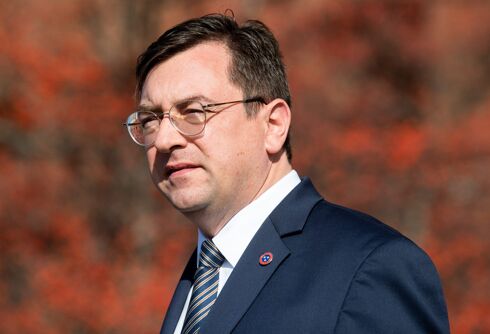An official from the International Chess Federation (FIDE) has explained the federation’s decision to ban trans competitors by citing differences between men’s and women’s “physical endurance” and “hormone levels.”
Critics of the policy say that trans players have been competing for years without any issues and that physical differences between the sexes don’t affect men’s and women’s competitiveness or intellectual abilities overall.
Related:
Champion cyclist Rachel McKinnon opens up about challenges of being a transgender competitor
“Trans women are women. We are female. And we are not taking over,” the doctor/professor/athlete wrote in an op-ed.
This week, the FIDE said it wanted to ban trans players from competing in its events for two years while the federation studies differences between cis and trans competitors.
Stay connected to your community
Connect with the issues and events that impact your community at home and beyond by subscribing to our newsletter.
In a statement, Dana Reizniece-Ozola, deputy chair of the federation’s management board, said, “What is still not clear is if the hormonal levels do influence the competitiveness in chess… You need some endurance working on the chess game for four or sometimes four or five and more hours in a longer period of time.”
She said that even though there’s no intellectual difference between men and women, trans competition in chess “really needs more and more research, scientifically-based research.” She added that the FIDE’s anti-trans ban is “actually to increase the rights of the transgender persons and allow them being registered under their new gender” in FIDE’s player directory.
However, players have still criticized the FIDE’s transphobic ban, which goes into effect on Monday.
Malcolm Pein, director of international chess at the English Chess Federation, said, “Transgender people have been competing very quietly, very happily for a long time with no issues. And we regard the latest developments as unwelcome,” the AP reported.
Pein said that over half a century’s worth of research into the attributes that make skilled chess players have shown that “the biological differences don’t account for very much.”
“There may be, you know, tiny differences to do with stamina maybe, and maybe there’s some suggestion of a difference in competitiveness at an early age,” he said. “But genuinely, we think that the disparity in playing strength and level between male and female players is due to the participation levels,” which historically have been predominantly male.
Women-only chess tournaments were only created in the 1970s, and even now only 2% of all competitive players are female, Reizniece-Ozola said. However, the number of female players has been increasing since the October 2020 premiere of The Queen’s Gambit, a Netflix dramatic miniseries which follows a female chess prodigy competing in the male-dominated game.
The German Chess Federation noted that the FIDE’s policy conflicts with its, France’s, and other countries’ trans-inclusive player policies.
British women’s champion Jovanka Houska suggested via Twitter that the FIDE backtrack and change its policy once again to be trans-inclusive.
Cathy Renna, communications director for the National LGBTQ Task Force in the United States, said the FIDE’s anti-trans ban had “no justification” and was “not grounded in reality” but was instead a case of “trans panic” that will marginalize trans people.















